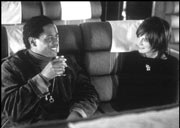FULL FRONTAL
directed by Steven Soderbergh
with Julia Roberts, Blair Underwood, David Hyde Pierce, and Catherine Keener
opens August 2 at Guild 45
Considerably less revealing than its title implies (Julia Roberts fans, leave your trench coats at home), Full Frontal chiefly represents Steven Soderbergh’s needless addition to a minor new millennial genre of prickly, self-reflexive Hollywood relationship pictures. As in Time Code (better) and The Anniversary Party (worse), Frontal peeks through keyholes to reveal frazzled stars, wanna-bes, and nobodies whose messy lives bear no relation to big-screen perfection. Captured up close with supposedly daring digital video candor, this perspective is less avant-garde than Tinsel Town soap opera.
Don’t get me wrong—soap operas can be fun to watch, and Frontal essentially doubles that fun with a movie-within-a-movie device (hence the avant-garde part). Frontal begins with a deliberately confusing collage of voices and head shots—actors auditioning for a movie?—then proceeds to the credit sequence for a film called Rendezvous. (Pay attention to these credits to help keep track of the names of characters to come.)
A glossy conventional melodrama, Rendezvous concerns a wary actor (Nicholas) gradually falling for the aloof journalist (Catherine) writing a magazine story on him. Nicholas is played by Calvin (Blair Underwood), and Catherine by Francesca (Julia Roberts).
Briskly alternating with scenes from Rendezvous is a kind of “making-of” documentary, rendered in v鲩t魳tyle digital video. This is where the inside-Hollywood stuff begins. Among the sundry characters are Rendezvous‘ screenwriters: journalist Carl (David Hyde Pierce), who’s married to Lee (Catherine Keener), and Arty (Enrico Colantoni), who’s also directing Carl’s play. Meanwhile, Lee’s sad-sack sister Linda (Mary McCormack) goes about her unhappy routine as a hotel masseuse. After the course of one very long, stressful Friday, most everyone will converge at the 40th birthday party of Rendezvous producer Gus (David Duchovny).
As with Traffic‘s color-coded sections, these two different worlds have completely different looks. Soderbergh—a fan of the reality-TV show Cops—plays with an audience predisposition to believe that the polished 35mm film is false and the gritty DV true. But don’t be so sure about that distinction. Frontal is an experimental film—with a script by Coleman Hough based on her play—that restates the movies’ eternal appearance-reality conundrum (it’s all fake!).
Hardly an academic exercise, Frontal gives its performers meaty material for the chewing. As usual, Soderbergh does his own camera work and gets up close to his subjects, using long, actor-friendly takes. The effect is a kind of Cassavetes indulgence, abetted by 10 somewhat tongue-in-cheek rules Soderbergh gave his cast (call them Dogma 2002). Samples: “Improvisation will be encouraged” and “You will have fun whether you want to or not,” both of which were obviously, gratefully followed.
Having been relegated to a rather stiff, thankless role in Soderbergh’s last effort (Ocean’s 11, where the boys had all the fun), Roberts here gets to play the bitchy prima donna who hectors her personal assistant about the celery in her tuna sandwich. Her role(s) also hint at the insecurities behind her own flighty, well-publicized love life. Underwood shows us the polite, simmering resentment of an actor whose leading-man stature suddenly shrinks, distorted by the lens, when he’s partnered with Brad Pitt (as himself) in a routine cop flick.
In addition to Roberts and Pitt, Soderbergh reaches back into his repertory company for Terence Stamp (both in and out of character from The Limey) and Nicky Katt, who improvises madly as an actor cast in Carl’s play, The Sound and the Fhrer. (“I’m taking a swim in Lake Me!” he raves.)
The twitchy, distracted Hyde Pierce provides the film’s emotional center as a weak but decent man whose career suddenly hinges on how he drinks his beer. (Glass or bottle?!? He knows his job’s on the line but can’t decide which way to guess.) Carl gets no more respect from his wife, whom Keener plays as a pull- out-the-stops nutcase. The corporate HR director displaces her own self-hatred by humiliating her exit-interview firees, bombarding them with random questions and a beach ball.
All this L.A. neurosis and neediness might seem headed for catastrophe, as in Time Code, Anniversary Party, or Short Cuts, and Frontal does set you up for the big earthquake, shooting, or car crash—then concludes with a different kind of jolt. It certainly doesn’t pack the Goddardian wallop Frontal fancies, but in a content-free summer of multiplex fodder, the movie still comes as a bracing slap against convention.









